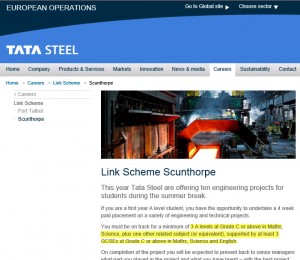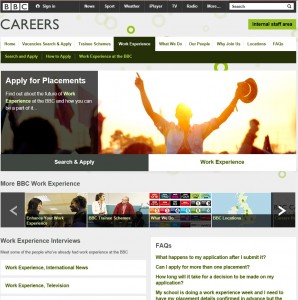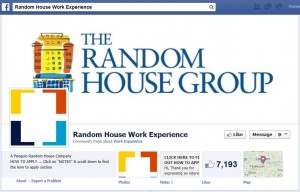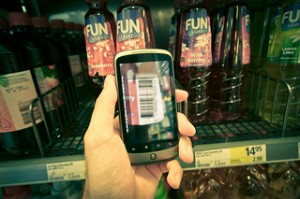I asked Alice, a sixth-form student spending a week with us for work experience, to look at the websites of companies offering work experience to people like her. This is what she found…
 Lots of sixth-formers (and younger!) look for work experience while thinking about what they might like to do in the future. Here are 9 suggestions based on my review of corporate websites.
Lots of sixth-formers (and younger!) look for work experience while thinking about what they might like to do in the future. Here are 9 suggestions based on my review of corporate websites.
1. Make it easy to find
It is really hard to find work experience over the internet so it is important that once you get to a website it is easy to navigate your way around the site – for example, with a layout that splits the information into sections so it’s easy to find what information applies to you.
The BBC’s website was the easiest to navigate and you could find work experience straight from the home page.
- It had links to different parts of the website including application forms, and explanations of what each part of the company does.
- The bright colours, images and design they used were really good, keeping it looking professional and appealing without looking childish.
The BBC website was perfect for its target audience and I thought had one of the best designs and layouts.
2. Make us feel welcome
It is important to sound friendly and pleasant on the web page because that makes the atmosphere of the company sound welcoming rather than daunting. This is important because we need to be comfortable enough in the work surroundings to ask questions, which is how to learn and is what the experience is about.
Numerous websites were good at sounding friendly and yet still professional, such as Penguin and the BBC.
3. Talk directly to us
One of the best features or language techniques I saw was when the company talked directly to you rather than indirectly. The benefit of talking directly is that:
- this makes the website feel a lot more personal and friendly, which makes the company sound a lot more appealing
- It also makes you feel like the company is taking you seriously and treating you like an adult rather than talking down to you.
One of the best companies for doing this was Tata Steel.

4. Tell us what skills we need
GSK and Tata Steel give a list of skills or requirements needed. This is useful because:
- It helps people who are looking for a specific type of work, telling them what they need to achieve and do to be able to apply.
- It also gives people who are genuinely interested in that certain field a better chance of being taken on.
It also benefits the company as it means that they will only be getting people applying who really want to come and work with them and who might be suitable.
5. Tell us what we need to know
The information content is really important and I found that it varies a lot between companies. The main things that I would want to know are:
- What skill would I need?
- What skills would I gain?
- What would I be doing on my work experience?
- How would I apply?
- What did other people think of it?
- And how would it help me with my future?
Cap Gemini have a limited amount of information on their website but a separate PDF file containing all you need to know about them and work experience with them. This is a really good way of providing information.

6. Show us what it is like
Something that I really liked on the BBC website was all the photos and videos of people who have previously been on work experience there.
- This shows people that are interested what actually happens on the work experience.
- Videos mean you get to hear what other people think that have been in your situation rather than the company just telling you about it.
This helps people who want to go on work experience and it will help the companies to get more people to apply.
7. Make it easy to apply
I found that most of the websites wanted you to apply online, however there were some that wanted you to ring up to apply;
- applying online is very easy and it gives you the chance to think about what you are writing in advance, which gives you the opportunity to maximise the possibility of being taken on
- If you apply over the phone it gives the company the chance to see how well you respond to questions and how well you think on your feet.
However phone conversations can be tricky and daunting especially if you have never met the person before so I would say that from the student’s point of view, the best method and the most beneficial method of applying would be online.
8. Use social media
 Channel 4 has a Facebook page for people who have been on work experience with them. I feel that it would be beneficial if more companies had open Facebook pages for young people and work experience as
Channel 4 has a Facebook page for people who have been on work experience with them. I feel that it would be beneficial if more companies had open Facebook pages for young people and work experience as
- more and more young people have Facebook now and it would really interest us if companies posted photos, videos and opinions so we could see how other people have found work experience
- And it would help us learn what the company does, how they do it and what actually goes on when you go for work experience with them.
I did find a page on Facebook for Random House. It is positive, kept up to date regularly with what is going on and also they take the time to reply to posts, which in my opinion makes them look committed to providing good work experience.
9. Make it easy to read
It is also important that the information is presented in the right way. I found that the websites that I learnt the most from were the ones that had the key points written in bullet form and each set of information under new headings.
I liked this layout because
- It meant I could pick out what information I wanted and what was relevant to me
- It looked appealing and made me more inclined to read it as it wasn’t just a big block of writing
- It also meant that I could remember the information more easily as it was broken up and not a solid mass of writing.
Even if students don’t apply for work experience with you, or if they aren’t accepted, their experience of the company’s web site and social media pages will affect their view of the company in the future.
Thanks Alice!
Lucy is Editor at Corporate Eye


